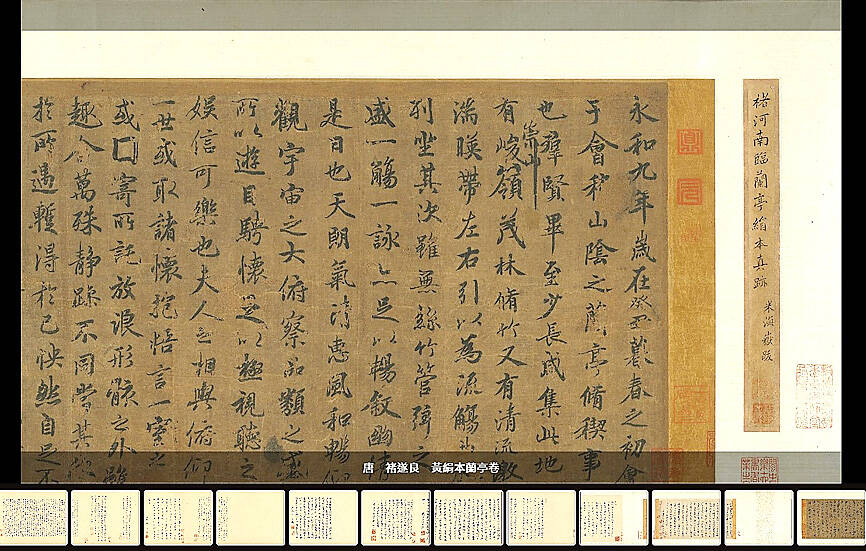The National Policy Foundation has launched a petition to urge the National Palace Museum to keep the Lanqian Shanguan art collection in Taiwan.
The collection was entrusted to the museum by Lin Po-shou (林柏壽) and the descendants of the Lin Pen-yuan (林本源) family, which was one of the five most important families in Taiwan with history dating back to the Qing Dynasty.
The lan and qian in the collection’s name refer to two great calligraphy works by Chu Sui-liang (褚遂良) and Huai Su (懷素) respectively. Lanqian Shanguan is the name of Lin Po-shou’s study room.

Photo: Screen grab from the National Palace Museum Web site
Lin Po-shou signed an agreement with the museum in 1969 to entrust the collection, which has increased to 349 items, including 133 paintings and 107 works of calligraphy.
However, the family was given only two weeks notice by the museum that the agreement would be terminated on Oct. 31.
The foundation on Tuesday announced that it would launch a petition on the National Development Council’s Public Policy Online Participation Platform.
The petition called for the museum to renew the agreement to entrust the collection, the Ministry of Culture to designate the collection a national treasure according to the Cultural Heritage Preservation Act (文化資產保存法) and for legislators to fulfill their responsibility of supervising the preservation of national treasures.
Apollo Chen (陳學聖), convener of the National Policy Foundation’s Education and Sports Division, said the short notice left the family overwhelmed, as the collection had been in the museum during eight directors’ terms.
The collection only occupies four cabinets so there is no lack of space, he said, adding that the law stipulated that the government should periodically conduct general surveys of, conserve and preserve national treasures.
Board chairwoman of the Taiwan Art Revitalization Culture Foundation Lee Yong-ping (李永萍) said that a nation famous for its culture and soft power should legally protect its national treasures and continue to enlarge the collection.

A group of Taiwanese-American and Tibetan-American students at Harvard University on Saturday disrupted Chinese Ambassador to the US Xie Feng’s (謝鋒) speech at the school, accusing him of being responsible for numerous human rights violations. Four students — two Taiwanese Americans and two from Tibet — held up banners inside a conference hall where Xie was delivering a speech at the opening ceremony of the Harvard Kennedy School China Conference 2024. In a video clip provided by the Coalition of Students Resisting the CCP (Chinese Communist Party), Taiwanese-American Cosette Wu (吳亭樺) and Tibetan-American Tsering Yangchen are seen holding banners that together read:

UNAWARE: Many people sit for long hours every day and eat unhealthy foods, putting them at greater risk of developing one of the ‘three highs,’ an expert said More than 30 percent of adults aged 40 or older who underwent a government-funded health exam were unaware they had at least one of the “three highs” — high blood pressure, high blood lipids or high blood sugar, the Health Promotion Administration (HPA) said yesterday. Among adults aged 40 or older who said they did not have any of the “three highs” before taking the health exam, more than 30 percent were found to have at least one of them, Adult Preventive Health Examination Service data from 2022 showed. People with long-term medical conditions such as hypertension or diabetes usually do not

POLICE INVESTIGATING: A man said he quit his job as a nurse at Taipei Tzu Chi Hospital as he had been ‘disgusted’ by the behavior of his colleagues A man yesterday morning wrote online that he had witnessed nurses taking photographs and touching anesthetized patients inappropriately in Taipei Tzu Chi Hospital’s operating theaters. The man surnamed Huang (黃) wrote on the Professional Technology Temple bulletin board that during his six-month stint as a nurse at the hospital, he had seen nurses taking pictures of patients, including of their private parts, after they were anesthetized. Some nurses had also touched patients inappropriately and children were among those photographed, he said. Huang said this “disgusted” him “so much” that “he felt the need to reveal these unethical acts in the operating theater

Heat advisories were in effect for nine administrative regions yesterday afternoon as warm southwesterly winds pushed temperatures above 38°C in parts of southern Taiwan, the Central Weather Administration (CWA) said. As of 3:30pm yesterday, Tainan’s Yujing District (玉井) had recorded the day’s highest temperature of 39.7°C, though the measurement will not be included in Taiwan’s official heat records since Yujing is an automatic rather than manually operated weather station, the CWA said. Highs recorded in other areas were 38.7°C in Kaohsiung’s Neimen District (內門), 38.2°C in Chiayi City and 38.1°C in Pingtung’s Sandimen Township (三地門), CWA data showed. The spell of scorching